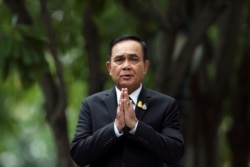Thailand's Constitutional Court on Friday ordered the dissolution of the country's most vocal pro-democracy party, Future Forward, after ruling that it took an illegal loan, a decision expected to strengthen the hand of the military-backed government.
The court also banned 16 of the Future Forward Party's top executives, most of them serving lawmakers, from politics for the next 10 years.
The party has denied any wrongdoing and decried the case as politically motivated.
ASEAN Parliamentarians for Human Rights, a group of former and serving lawmakers from across Southeast Asia, urged Thai authorities to end what it called the harassment of the country's pro-democracy parties and activists.
"The Future Forward Party is the latest in a long line of opposition political parties in Thailand to be banned. It is increasingly apparent that any party which seeks to threaten the military and the establishment's political hegemony will not be tolerated," Francisca Castro, a member and lawmaker from the Philippines, said in a statement.
Future Forward has been in the cross-hairs of Thailand's politically powerful military since a 2019 general election campaign that saw the novice party slamming the junta that took power in a bloodless coup five years earlier. Coupled with a progressive platform and a charismatic, young leader in auto-parts billionaire Thanathorn Juangroongruangkit, the party came out of the poll a strong third.
But with the help of a senate handpicked by the junta, a formula for allocating lower house seats favorably adjusted by a junta-appointed election commission, and promised cabinet posts for allies, the military's proxy party, Palang Pracharath, managed to cobble together a majority coalition that chose the prime minister, junta leader Prayut Chan-ocha.
Future Forward has been the sharpest thorn in his government's side ever since, pushing for a popularly elected senate, an end to military conscription and a cut in defense spending. It rallied the opposition bloc in a very nearly successful push for an investigation of the military's many diktats during the junta years and alone voted against the transfer of two army units to the direct command of King Maha Vajiralongkorn, who has backed Prayut's rule.
The effort earned Future Forward and its leaders more than 20 lawsuits, including one that forced Thanathorn out of his elected seat for owning shares in a media company while campaigning, an allegation he denies.
It also earned the party an especially strong following among young voters weary of Thailand's cycle of coups — two since 2006, 13 since becoming a constitutional monarchy in 1932.
Its court-ordered demise spells more trouble for the country's already-turbulent politics, said Joshua Kurlantzick, a senior fellow for Southeast Asia at the Council on Foreign Relations, a U.S.-based research group.
"I think there will be significant anger among younger people, who are getting increasingly furious not only with the political stasis, and with their voices not being heard, but with the poor economy for them," he said.
"Thai youths are getting bolder in standing up to the military, the monarchy, and the system generally. This combination of sclerotic politics and empowered young people does not bode well for the future of Thai politics."
By banning Future Forward's executives from politics for the next decade, Friday's court order will boost the ruling bloc's position in the lower house, where it has been clinging to a razor-thin majority since the election.
New party?
Future Forward says it plans to set up a new party to which its rank-and-file representatives can migrate.
The government will be hoping to pick off at least some of them, too, said Prajak Kongkirati, a political science professor at Thailand's Thammasat University.
"That's the intention of the government," he said. "They believe that by dissolving the party, some party members, some MPs who [are] not strongly committed to the party will ... abandon the party and join [some] other party on the government side."
But Thitinan Pongsudhirak, a political analyst and lecturer at Thailand's Chulalongkorn University, said Future Forward's voters will stay loyal.
"I think the Future Forward base is very deep, and it's broadening. And the fact that Thanathorn is still out and about and he's still ... reaching out to the different bases and broadening his party, I think that the movement behind Future Forward will certainly be sustained. The name may change, but the movement will stay," he said.
The analyst added: "A lot of these younger people, they are sick and tired of the Thai conflict over the last 15 years. And they've seen two military coups that have put the same people in power. They have seen several elections that have gone nowhere. So I think a lot of these people are ... trying to take back their country."
Anticipating the court's action, Future Forward drew thousands of supporters to a rally in downtown Bangkok in December to denounce the government. But analysts do not expect an immediate return to the sometimes violent mass protests that have periodically rocked the Thai capital over the past few decades.
Kurlantzick said countries doing business in Southeast Asia's second-largest economy were watching developments closely but growing inured to the turmoil.
"There is a degree of understanding, especially among foreign companies, that Thailand has had a long period of unrest, and that's certainly not good, but it's just become a part of business life in the kingdom. Long term, that's not going to help investment from Western companies, but it's sort of being priced in for now," he said.
Thailand has also been a close military ally of America in a part of the world where the U.S. is competing fiercely with China for influence. Though U.S. arms sales to the country tailed off in the wake of the 2014 coup, they have picked up since last year's election.
Kurlantzick does not expect the detente to end just yet.
"The White House has generally wanted to push a policy of boosting ties with Thailand, and I think — while Future Forward's ban might lead to some consternation in Congress and some in the administration — it will not stop arms sales," he said.
Case against Future Forward
The case against Future Forward stemmed from a pair of loans Thanathorn had extended to his fledgling party worth a combined $6 million to see it through the election campaign.
In its complaint to the court, the Election Commission claimed the loan broke articles of Thailand's law on political parties that make no mention of loans as a legitimate source of revenue and cap an individual's donations within 12 months at about $320,000. As a consequence, the commission reasoned, Future Forward also broke another article of the law that bars parties from accepting donations, assets or other benefits from illegitimate sources and which includes dissolution as punishment.
Future Forward said the loans were above board and should not count as either a donation or revenue.
Advisers to the Election Commission seemed to agree.
According to local media, leaked commission records showed that two panels the election body set up to probe the case had recommended dropping it, reasoning that loans are not income.












